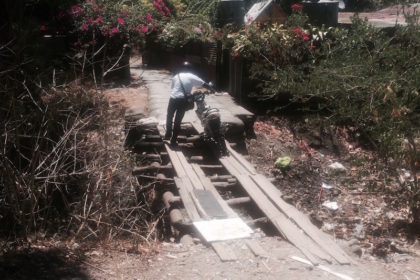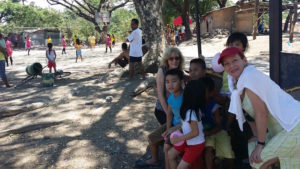
On a steamy Saturday morning this February, I witnessed a first-ever musical exchange in LaMPara, a site of the Philippine El Sistema program Ang Misyon. (The name refers to the three cities within greater Manila served by the site: Las Pinas, Muntinlupa, and Paranaque.) LaMPara is located in a squatter’s village built on the precincts of “Tropical Palace,” a posh resort built in the ‘70s but long ago shuttered, abandoned, and overgrown. The main gathering place in the village is a dirt floor basketball court by surrounded by piecemeal corrugated tin and wood shacks, open table stalls of food for sale, and people sitting on crates and plastic chairs. The entry has been upgraded in the two years since we were last there—the rickety wooden planks are now concrete paths. Built by the government, these are small signs of progress amid hard poverty that shows few evidences of hope. I was told that the government had made the improvement to prevent more people from being swept away and drowned in the flash floods of the rainy season.
Twelve students of Ang Misyon awaited us with their instruments in the clearing by the big tree. They were around 12 or 13, and they looked hopeful and expectant. We helped them set up plastic chairs that had names penned on their backs like donors’ plaques at the opera, and then moved them out of the sun to the other end of the basketball court under the giant tree, to be in the shade. Many of the kids wore their Ang Misyon shirts that read, “where classical music is a life of service.” Other tee shirts read “Drive Fast,” “Vogue,” “Ich bin ein New Yorker” and “Unstoppable,” donated from overseas charities.
They took out their instruments to rehearse before their guests arrived, and did their own tuning. (Jovianney Emmanuel Cruz, the founder/director of Ang Misyon, checked and adjusted their work). They milled around during setup exactly as musicians do in orchestral rehearsals anywhere. They started to play a Handel piece, but the rhythm wasn’t right. Jovianney stopped them and asked for a volunteer to serve as concertmaster to cue their start—there was much shyness and giggling about who would step forward from the semicircle of players to take the leadership role. The first choice, a shy girl, couldn’t indicate the start clearly enough, so a replacement stepped up. Some cheering and laughing the first time they got it right. Jovianney made them begin together on the cue “six times right” before moving on.
There was wood smoke in the air. Dirty dogs wandered around and between the kids, even as they played. A rooster crowed unpredictably, occasionally in good tune with the music. Birds sang elaborate strange melodies, and scrawny turkeys wandered around in the way chickens sometimes do. Younger children gathered to watch in wordless fascination, mostly barefoot, one or two littler ones naked. They would be violinists too, perhaps, when they were old enough.
Then the guest musicians for this “exchange” arrived: a group of some ten kids, ages 10-15, from the Music Ministry Club at the Assumption School. These kids came from wealthy families, and had probably had never imagined that people anywhere could live like this. They were trying to be relaxed and cool—they clumped together, relying on their social skills of trained politeness, but they were clearly overwhelmed by the hard poverty they were seeing.
Tinky Cabanatan Cruz, the associate director of Ang Misyon and Jovianney’s wife, had arranged the visit. The rich kids had been driven there in a school van and private cars with chauffeurs; a few, including the daughter of a state governor, had bodyguards accompanying them. Tinky insisted that the kids come into LaMPara without the drivers and guards (their parents would never have approved this, had they known). So they were vulnerably on their own.
The LaMPara kids played their Handel piece—another shock for the visitors, to discover that the young people of this unimaginable place played much better than they did, even though they were “The Music Ministry Club.” At Tinky’s request for them to respond with some music, some hesitant glances and silent negotiation prompted one female guitar player to set up a chair and delver an almost inaudible version of the Beatles’ Blackbird, with a few basic chords, which was followed by another student’s equally rudimentary Here Comes the Sun.
The LaMPara kids played again, and were getting steadily better as more drifted in, quietly tuned and joined. Then their strength arrived—students from the Orchestra of the Filipino Youth (OFY), the top orchestra of Ang Misyon. OFY players work as teachers in the community programs. (I should mention that the OFY is getting really good, almost good enough to be compared in quality to the professional orchestras in The Philippines. If all goes well, they could be the best orchestra in the country before too long.) As the OFY players and additional Ang Misyon students joined the LaMPara ensemble, the sound settled into a lively confidence. They were only two cellos for three players, so they took turns.
After a few more rounds of musical exchange, with the mismatch of quality and commitment becoming more and more obvious, I sensed the awkwardness on both sides lessen. The tension of social inequality eased, simply because the poor kids played better. This somehow balanced the scales, enabling the rich kids to feel genuine respect for their poor peers, and enabling the LaMPara kids to extend kindness and generosity. Condescension and social prejudice evaporated in the presence of substantial musical capacity.
There were snacks after the musical sharing, a big treat for the LaMPara musicians—Ang Misyon had brought “apple pies” from MacDonald’s and soda in bottles that they poured into plastic bags to drink from. There wasn’t much mixing between the groups during the snack time, but there was little around the edges, and there was a genuine warmth when they said goodbye with a lot of handshakes. We supervising adults were given gifts the wealthy kids had brought from their school, a special kind of “Assumption cookie” that was a good as they told us it would be.
As we returned to the parking area via the dirt track through the tropical vegetation, over the new concrete slabs, one of the girls from the Assumption School pulled Tinky aside. This wealthy, sophisticated teenager was clearly moved and at a rare loss for words; she said, “What I saw has changed my life.”
The Assumption Music Mission Club didn’t immediately pile into the school van and limousines with the drivers and guards who awaited them. They stayed in a clump, talking and not talking, just standing together for the ten minutes it took us to get in our car and drive away. They were still talking as the dust trail rose from our departing car.
— Eric

Tricia with Jamie Bernstein in Lampara, May 2015